- Home
- John Boyne
The Heart's Invisible Furies Page 2
The Heart's Invisible Furies Read online
Page 2
And grand, she thought as she left the house for the final time before making her way along the road to the post office, where she sat on the dry grass until a bus arrived, taking a backseat by an open window and breathing steadily throughout the journey to stop her from getting sick as it took her over rocky terrain into Ballydehob and the front of Leap, onward to Bandon and Innishannon before twisting north into Cork City itself, a place she had never visited but that her father had always said was filled with gamblers, Protestants and drunkards.
For two pence, she drank a bowl of tomato soup and a cup of tea in a café on Lavitt’s Quay and then walked along the banks of the River Lee to Parnell Place, where she bought a ticket for Dublin.
“Do you want a return?” the driver asked her, shuffling his satchel as he rooted around for change. “You’ll save money if you’re coming back again.”
“I won’t be coming back,” she replied, taking the ticket from his hands and placing it carefully in her purse, for she had a sense that this might be an item that would be worth holding on to, a paper memory with the date of the beginning of her new life stamped across it in heavy black ink.
From Out Near Ballincollig
A lesser person might have felt frightened or upset as the bus pulled away from the quays to begin its journey north but not my mother, who held a staunch conviction that the sixteen years she had spent in Goleen being spoken down to, ignored or treated as somehow less important than any of her six brothers had led her toward this moment of independence. Young as she was, she’d already made an uneasy peace with her condition, which, she told me later, she had discovered for the first time in Davy Talbot’s grocery shop on the main street, standing next to ten piled-up boxes of fresh oranges, when she felt my unformed foot give a little kick into her bladder, just a spasm of discomfort that might have been anything at all but that she knew would eventually be me. She didn’t consider any back-room terminations, even though there was gossip among some of the girls in the village regarding a widow-woman in Tralee who did terrible things with Epsom salts, rubber vacuum bags and a pair of forceps. For six shillings, they said, you could be in and out of her house in a couple of hours, three or four pounds the lighter. No, she knew exactly what she was going to do when I was born. She simply had to wait until I arrived in order to put her Great Plan into place.
The bus to Dublin was busy and at the first stop a young man climbed on board carrying an old brown suitcase and glanced around at the few remaining empty seats. As he paused next to my mother for a moment, she could feel his eyes burning into her but didn’t dare turn to look at him in case he was someone familiar with her family who had already heard the news of her shame and would only need to see her face to make some cutting remark. Nothing was said, though, and after a moment he walked on. Only when the bus had traveled another five miles along the road did he make his way back to where she was sitting and point at the empty place beside her.
“Do you mind?” he asked.
“Do you not have a seat down the back?” she asked, glancing toward the rear of the bus.
“The fella next to me is eating egg sandwiches and the smell of them is knockin’ me sick.”
She shrugged and moved her coat to let him sit down, taking him in with a quick glance as she did so. He was wearing a tweed suit with a tie loosened at the neck and a cap that he took off and held between his hands. A couple of years older than her, she decided, eighteen or nineteen perhaps, and although my mother was what in those days was called “a looker,” the combination of her pregnancy and the dramatic events of the morning left her in no mood for flirtation. Boys in the village had often tried to initiate romances with her, of course, but she had never been interested, earning a reputation for virtue that had now been shattered. There were a few girls of whom it was said that it only took a little encouragement for them to do something or show something or kiss something, but Catherine Goggin had never been one of them. It would come as a shock to those boys, she realized, when they learned of her disgrace and there would be some among them who would regret never having tried a little harder to seduce her. In her absence they would say that she had always been a floozy and this mattered a great deal to my mother, for she and the person they would fashion from their sordid imaginations would have little in common except for a name.
“Soft day all the same,” said the boy next to her.
“What was that?” she asked, turning to look at him.
“I said it was a soft day,” he repeated. “Not bad for this time of year.”
“I suppose so.”
“Yesterday it was raining and the sky this morning looked heavy with showers. But look, there’s been no spillage at all. It’s grand out.”
“You take an interest in the weather, do you?” she asked, hearing the sarcastic tone in her voice but not caring.
“I grew up on a farm,” he told her. “It’s second nature to me.”
“I did too,” she said. “My father spent half his life staring at the sky or sniffing the late-afternoon air for rumors of what was to come the following day. They say it always rains in Dublin. Do you believe that?”
“We’ll find out soon enough, I suppose. Do you go all the way, you do?”
“I beg your pardon?”
His face went scarlet, from the base of his neck to the tips of his ears, and the speed of the transformation fascinated her. “To Dublin,” he said quickly. “Do you go all the way to Dublin or will you be getting off at one of the stops?”
“Do you want my window seat?” she asked. “Is that it? Because you can have it if you want. I’m not particular.”
“No, not at all,” he said. “I was only asking. I’m happy where I am. Unless you’re going to start in on the egg sandwiches too, that is.”
“I’ve no food at all,” she told him. “I only wish I did.”
“I have half a baked ham in my case,” he told her. “I could slice you off a rasher if that would help.”
“I couldn’t eat on a bus. I’d be sick.”
“Can I ask you your name?” asked the boy, and my mother hesitated.
“Is there a reason you want to know it?”
“So I can call you by it,” he said.
She looked into his face and for the first time noticed how handsome he was. A face like a girl’s, she told me afterward. Clear skin that had never known the pull of a razor. Long eyelashes. Blond hair that tumbled over his forehead and into his eyes no matter how hard he tried to tame it. There was something in his manner that made her believe that he wasn’t a threat to her in any way and so she relented, letting down her guard at last.
“It’s Catherine,” she said. “Catherine Goggin.”
“Pleased to meet you,” he replied. “I’m Seán MacIntyre.”
“Are you from the city, Seán?”
“No, I’m from out near Ballincollig. Do you know it there?”
“I’ve heard of it but I’ve never been there. I’ve never been anywhere, really.”
“Well, you’re going somewhere now,” he said. “Up to the big smoke.”
“I am, yes,” she said, turning to look out the window at the fields as they passed and the children working in the haystacks, who jumped up and down to wave when they saw the bus coming along the road in their direction.
“Do you go up and down a lot?” asked Seán a moment later.
“Do I what?” she asked, frowning at him.
“To Dublin,” he said, putting a hand to his face, and perhaps he was wondering why everything he said seemed to come out the wrong way. “Do you go up and down the road a fair amount? Maybe you have family up there?”
“I don’t know a soul outside West Cork,” she told him. “The place will be a mystery to me. What about yourself?”
“I’ve never been there but a friend of mine went up over a month ago and got a job quick-smart in the Guinness Brewery and he said there’s one waiting for me there too if I want it.”
“Do them
lads not spend all their time drinking the profits?” she asked.
“Ah no, sure there’d be rules, like. Bosses and so on. Fellas going round making sure that no one’s supping the porter. My friend, though, he tells me that the smell of the place would drive you half wild. The hops and the barley and the yeast and what have you. He says you can smell it on the streets all around and the people who live nearby go around with daft expressions on their faces all day long.”
“They’re probably all drunk,” said my mother. “And it didn’t cost them a penny.”
“My friend says it takes a few days for a new worker to get used to the smell of the place and until you do you can feel queer sick.”
“My daddy likes a Guinness,” said my mother, recalling the bitter taste of the yellow-labeled bottles that my grandfather occasionally brought into the house and that she had tried herself once when his back was turned. “He goes down to the pub every Wednesday and Friday night, as regular as clockwork. On Wednesdays he limits himself to three pints with his pals and comes home at a respectable time but on Friday nights he gets polluted. He’ll often come in at two o’clock in the morning and rouse my mother from her bed to cook him a plate of sausages and a ring of black pudding and if she says no, then he raises his fists to her.”
“Every night was a Friday night with my daddy,” said Seán.
“Is that why you want to get away?”
He shrugged. “Partly,” he said after a long pause. “There was a bit of trouble at home, if I’m honest. It was for the best that I leave.”
“What kind of trouble?” she asked, intrigued now.
“Do you know, I think I’d rather just put it all behind me if it’s all the same to you.”
“Of course,” she said. “It’s none of my business anyway.”
“I didn’t mean it like that.”
“I know you didn’t. It’s fine.”
He opened his mouth to say something more but their attention was distracted by a little boy running up and down the aisle. He wore the headdress of a Red Indian and was making the sounds to match, a terrible howling that would have given a deaf man a headache. The bus driver let out an almighty roar and said that if someone didn’t take control of that child, then he’d turn the bus around and take them all back to Cork City and there would be no refunds for anyone.
“So what about you, Catherine?” asked Seán when peace was restored. “What takes you up to the capital?”
“If I tell you,” said my mother, who somehow already felt that she could trust this stranger, “will you promise not to say anything cruel to me? I’ve heard a lot of unkind words today and, truth be told, I don’t have the strength for anymore of them.”
“I try never to say unkind words,” replied Seán.
“I’m to have a baby,” said my mother, looking him full square in the eye and without an ounce of shame. “I’m to have a baby and I don’t have a husband to help me rear him. And there’s war over it, needless to say. My mammy and daddy threw me out of the house and the priest said I was to leave Goleen and never darken the place again.”
Seán nodded but this time, despite the indelicacy of the subject, he didn’t blush. “Sure these things happen, I suppose,” he said. “We’re none of us perfect.”
“This one is,” said my mother, pointing toward her belly. “For now anyway.”
Seán smiled and looked ahead, and they said nothing to each other for a long while after that and perhaps they both dozed off or perhaps one of them shut their eyes to give that impression so they could be left alone with their thoughts. Either way, it was more than an hour later when, awake again, my mother turned to her companion and touched him lightly on the forearm.
“Do you know anything about Dublin?” she asked. Perhaps it had finally struck her that she had no idea what she would do or where she would go when they arrived.
“I know that it’s where Dáil Éireann sits and that the River Liffey runs through the heart of it and Clerys department store stands on a big, long street named after Daniel O’Connell.”
“Sure there’s one of those in every county of Ireland.”
“True enough. Just like there’s a Shop Street. And a Main Street.”
“And a Bridge Street.”
“And a Church Street.”
“God preserve us from the Church Streets,” said my mother with a laugh, and Seán laughed too, a pair of kids giggling at their irreverence. “I’ll go to hell for that,” she added when the laughter stopped.
“Sure we’re all going to hell,” said Seán. “Me worst of all.”
“Why you worst of all?”
“Cause I’m a bad lad,” he said with a wink, and she laughed again and felt a need to go to the toilet, wondering how long it would be before they might stop somewhere. She told me afterward that this was the only moment during their acquaintance when she felt anything close to an attraction for Seán. In her mind she entertained a brief fantasy that they would leave the bus as sweethearts, marry within the month and bring me up as their own. A nice dream, I suppose, but it was never going to be.
“You don’t strike me as a bad lad,” she told him.
“Ah, you should see me when I get going.”
“I’ll bear that in mind. So tell me about this friend of yours. How long did you say he’s been up in Dublin?”
“Just over a month now,” said Seán.
“And do you know him well?”
“I do, yes. We got to know each other a couple of years back when his father bought the farm next to ours and we’ve been great pals ever since.”
“You must be if he’s setting you up with a job. Most people just look out for themselves.”
He nodded and looked down at the floor, then at his fingernails, then out the window. “Portlaoise,” he said, noticing a passing sign. “We’re getting closer anyway.”
“Do you have brothers or sisters who’ll miss you?” she asked.
“No,” said Seán. “There was just me. After I was born, my mammy couldn’t have anymore and Daddy never forgave her for it. He plays around, like. He has a few different fancy-women and no one ever says a thing about it because the priest says that a man expects a houseful of children from his wife and a barren field takes no planting.”
“They’re sweethearts, aren’t they?” asked my mother, and now Seán frowned. For all his mischief, he wasn’t accustomed to mocking the clergy. “I have six brothers,” she told him after a moment. “Five of them have straw in their heads where their brains should be. The only one I have any time for, my youngest brother Eddie, wants to be a priest himself.”
“How old is he?”
“A year older than me. Seventeen. He goes into the seminary in September. I don’t think he’ll be happy, because I know for a fact that he’s mad for the girls. But he’s the youngest, you see, and the farm has already been parceled off for the first two, and the next two are to be teachers, and the fifth wouldn’t be capable of work on account of a softness in his head, so that just leaves Eddie and so he must be the priest. There’s great excitement over it, of course. I suppose I’ll miss all that now,” she added with a sigh. “The visits and the clothes and the ordination by the bishop. Do you think they let fallen women write letters to their seminarian brothers?”
“I know nothing of that life,” said Seán, shaking his head. “Can I ask you a question, Catherine, and you can tell me to go and whistle if you don’t want to answer it.”
“Go ahead so.”
“Does the daddy not want to take some responsibility for…you know…for the baby?”
“He does on his eye,” said my mother. “Sure he’s happy as Larry that I’ve got out of the place. There’d be murder if anyone found out who it was.”
“And are you not worried at all?”
“About what?”
“About how you’re going to cope?”
She smiled. He was innocent and kind and perhaps a little naïve, and there was a part of her
that wondered whether a big city like Dublin was the right place for a fella like him. “Of course I’m worried,” she said. “I’m worried out of my head. But I’m excited too. I hated living in Goleen. It suits me to get away.”
“I know that feeling. West Cork does funny things to you if you stay there too long.”
“What’s your friend’s name anyway? The one at Guinness’s?”
“Jack Smoot.”
“Smoot?”
“Yes.”
“That’s a fierce odd name.”
“There’s Dutch people in his family, I think. Going back, like.”
“Do you think he’d be able to find a job for me too? I could work in the office maybe.”
Seán looked past her and bit his lip. “I don’t know,” he said slowly. “I’ll be honest with you and say that I wouldn’t like to ask him as he’s already put himself out to find a place for me and him only in the door a wet week.”
“Of course,” said my mother. “I shouldn’t have asked. Sure I can take a stroll up there myself one day if nothing else shows up. I’ll have a sign made and wear it around my neck. Honest Girl Seeks Work. Will Need Some Time Off in About Four Months. I shouldn’t joke about it, should I?”
“You’ve nothing to lose, I suppose.”
“Would you say there are lots of jobs in Dublin?”
“I’d say that you wouldn’t be too long looking anyway. You’re a…you know…you’re a—”
“I’m a what?”
“You’re pretty,” said Seán with a shrug. “And employers like that, don’t they? You could always be a shop girl.”
“A shop girl,” said my mother, nodding slowly, considering it.
“Yes, a shop girl.”
“I suppose I could.”

 Beneath the Earth
Beneath the Earth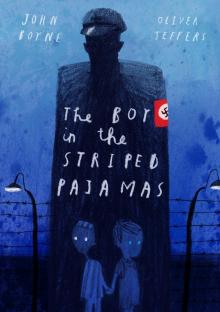 The Boy in the Striped Pajamas
The Boy in the Striped Pajamas Next of Kin
Next of Kin The House of Special Purpose
The House of Special Purpose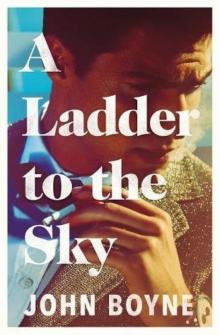 A Ladder to the Sky
A Ladder to the Sky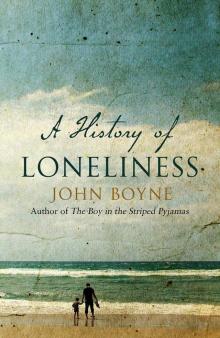 A History of Loneliness
A History of Loneliness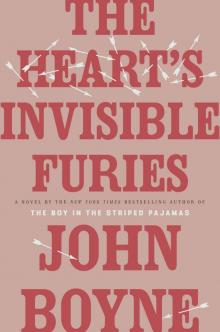 The Heart's Invisible Furies
The Heart's Invisible Furies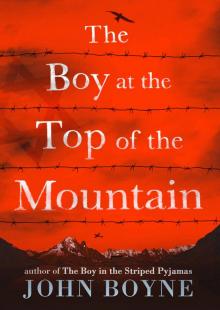 The Boy at the Top of the Mountain
The Boy at the Top of the Mountain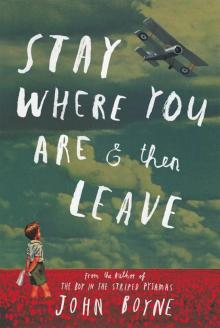 Stay Where You Are and Then Leave
Stay Where You Are and Then Leave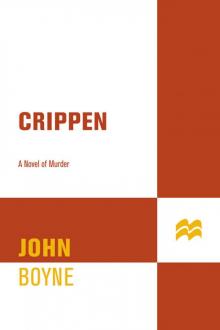 Crippen: A Novel of Murder
Crippen: A Novel of Murder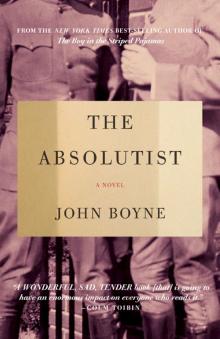 The Absolutist
The Absolutist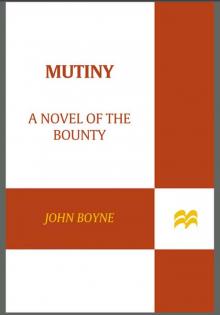 Mutiny: A Novel of the Bounty
Mutiny: A Novel of the Bounty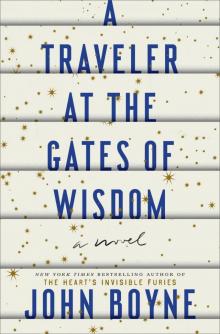 A Traveler at the Gates of Wisdom
A Traveler at the Gates of Wisdom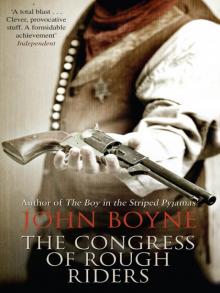 The Congress of Rough Riders
The Congress of Rough Riders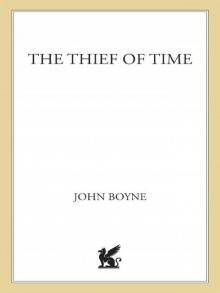 The Thief of Time
The Thief of Time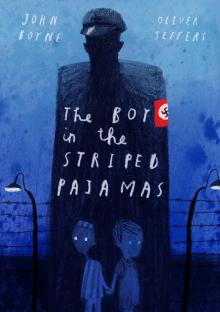 The Boy in the Striped Pajamas (Deluxe Illustrated Edition)
The Boy in the Striped Pajamas (Deluxe Illustrated Edition)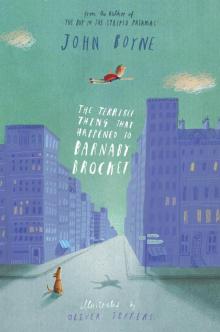 The Terrible Thing That Happened to Barnaby Brocket
The Terrible Thing That Happened to Barnaby Brocket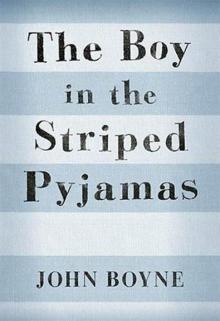 The Boy In The Striped Pyjamas
The Boy In The Striped Pyjamas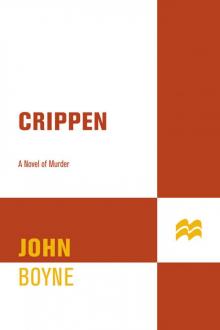 Crippen
Crippen